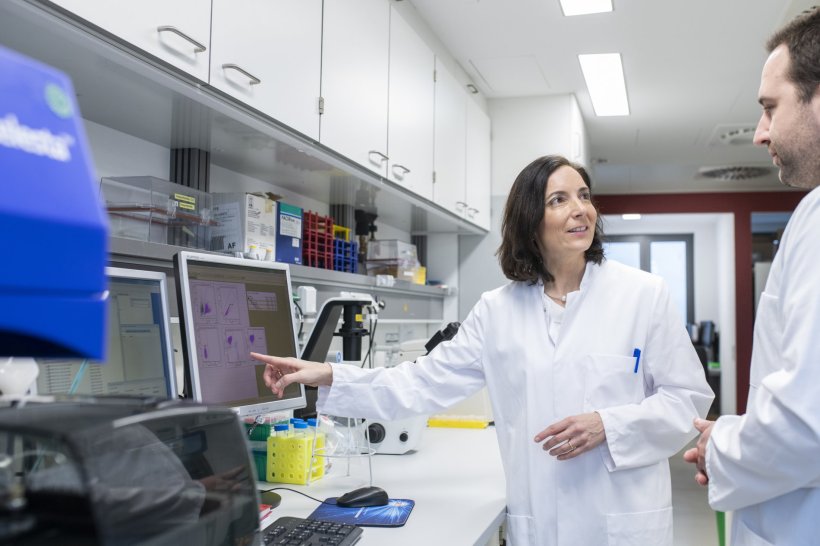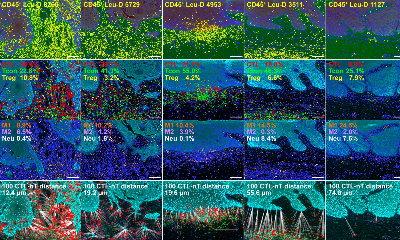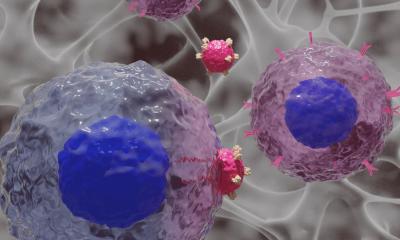
Image source: Goethe University Frankfurt; photo: Peter Kiefer
News • Research into new therapies
How natural killer cells could fight leukemia more effectively
Every year, some 13,000 people in Germany are diagnosed with leukemia. Despite intensive chemotherapy, around one in two of them die.
Making matters worse is the fact that the therapies currently available have severe side effects and inhibit the formation of new healthy blood cells in particular. One alternative is therapy concepts that harness the immune system’s natural power. It is important to note, however, that tumor cells have mechanisms capable of slowing down the immune cells’ attack. Professor Evelyn Ullrich’s team at Universitaetsmedizin Frankfurt has now succeeded in making leukemia-specific immune cells less sensitive to the influence of tumor cells, thereby significantly increasing their effectiveness.
The researchers published their findings in the journal Nature Communications.
Various forms of blood cancer exist – all of which are grouped together under the term leukemia. One common form of leukemia is acute myeloid leukemia (AML), characterized by a degradation of early blood cell precursors, i.e. stem cells and the precursor cells that develop from them. Despite treatment with intensive chemotherapy, only between 20%-50% of patients survive the first five years after diagnosis and treatment. Further compounding the situation is the fact that these intensive therapies have a particularly damaging effect on the blood-forming stem cells, and are therefore associated with very severe side effects. That is why there is an urgent need for new therapeutic approaches.

Image source: Goethe University Frankfurt; photo: Peter Kiefer
One approach is immunotherapies, such as those researched by Evelyn Ullrich and her team at Universitätsmedizin Frankfurt’s Clinic for Pediatrics and Adolescent Medicine. “Immunotherapies use the immune system’s natural power against malignant leukemia cells,” explains the Professor of Cellular Immunology. As part of the process, the cancer cells are recognized by the immune system’s killer cells, such as T cells. A T cell, for instance, has a lock-shaped structure on its surface into which a corresponding structure on the cancer cell’s surface fits like a key. In technical terms, the lock of the T cell is referred to as an “antigen receptor”, while the key is called an “antigen”. If the “key” is in the “lock”, i.e. if the antigen and receptor bind, the T cell kills the cancer cell. “Today, we are able to tailor the antigen receptor in a manner that makes it aware of a specific tumor feature,” the physician explains. To do this, T cells are purified from the patient’s blood. Using genetic engineering techniques, a so-called chimeric antigen receptor (CAR) is then inserted, which combines the properties of several proteins in a manner allowing the attack to be optimized on this specific tumor.
T cells equipped with a chimeric antigen receptor (CAR T-cells) are already being successfully applied in the treatment of leukemia. Another type of killer cell that is now also being used are the so-called natural killer cells (NK). Rather than recognizing malignant cells by certain antigens, they rely on other surface anomalies. If additionally enhanced with a chimeric antigen receptor, they are capable of fighting cancer cells in two ways. Another advantage of CAR-NK cells is that they have hardly caused any side effects in clinical studies to date.
It is particularly promising that our double-modified NK cells even worked against cancer cells whose molecular profile is often associated with increased resistance to therapy
Tobias Bexte
Cancer cells, however, have various means at their disposal to evade such an immune cell attack, including their ability to simply switch off immune cells before an attack begins. For this, they rely on a “checkpoint”, consisting of a protein on the immune cell’s surface. This “immune checkpoint” explicitly checks each individual cell that has bound to the antigen receptor to ensure that it is not one of the body’s own cells. The latter give the checkpoint a corresponding response, whereupon the immune attack ceases. In a healthy body, this process ensures that immune cells do not inadvertently attack normal body cells, thereby causing major damage.
Since cancer cells are, at their origin, also the body’s own cells, some of them are capable of communicating with the checkpoint and stopping the immune cells’ attack. Such an attack can also affect the CAR immune cells – posing a major problem for current immunotherapies. That is why immunotherapies are often combined with drugs that shield the immune cells’ checkpoints in such a manner that cancer cells can no longer access them.
Ullrich’s team has now found another way to prevent the customized immune cells from being switched off. In laboratory experiments, doctoral students Tobias Bexte and Nawid Albinger succeeded in completely switching off an important immune checkpoint in NK cells that were specifically directed against AML cells. To that end they cut the corresponding gene using the CRISPR/Cas “gene scissors” in a manner that prevents the checkpoint from forming. In so doing, the researchers successfully prevented the cancer cells from forcing immune tolerance in experiments with patient cells.
The CAR-NK cells without the immune checkpoint were better capable of killing cancer cells from AML patients than NK cells that either only carried the CAR receptor or lacked the immune checkpoint alone. “It is particularly promising that our double-modified NK cells even worked against cancer cells whose molecular profile is often associated with increased resistance to therapy,” explains Tobias Bexte, clinician scientist at Goethe University Frankfurt. Mice to which the researchers transferred human AML cells survived significantly longer after having been administered these double-modified NK cells – even at significantly reduced drug doses. “Future studies must now clarify whether the tailor-made immune cells also work in humans,” Ullrich says in summarizing the next steps and goals of her research.
Source: Goethe University Frankfurt
20.12.2024





